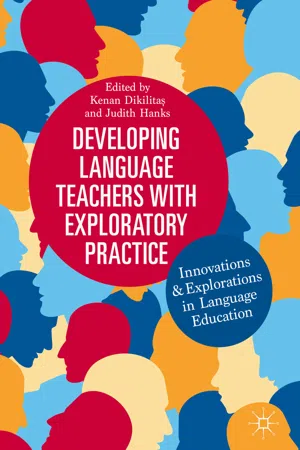Exploratory Practice (EP) is a dynamic and empowering form of practitioner research in language education. It presents an original and rigorous approach to practitioners researching their classrooms. To date, however, there have been relatively few accounts of/by practitioners themselves engaging in their own EP work. This book presents chapters written by language teaching professionals encountering the EP principles and enacting EP in Turkey, Northern Cyprus, and beyond, for the first time. Crucially, we take an ethical stance of honouring the time, effort and commitment of practitioner-researchers by clearly acknowledging their authorship. In reading their accounts, we gain not only the practical examples of voices from the field, but also engage in theorising our practice as language teachers and teacher educators in meaningful ways.
We believe this book will benefit those interested in professional development in different fields of (
language) education with a special focus on:
encouraging teachers, teacher educators, and others who are interested in engagement in EP by providing examples and discussions from the work of practitioners
describing and discussing the enactment of Potentially Exploitable Pedagogic Activities (PEPAs) in/through classroom language learning/teaching
creating a resource of teachers’ (and ultimately learners’) written work which links with similar work in other settings such as Latin America and the UK
Because of its original approach, EP has already had a major
impact upon the field of
language education. But for those who are new to EP, it is necessary to explain what we mean by ‘
principles ’ and ‘practice’ right from the start. In considering ‘practice’ we include all forms of teaching and learning activity, including language teacher education
, continuing professional development and
curriculum development, as well as considering what goes on in the classroom itself. The principles which underpin Exploratory Practice have been developed with and for practitioners in
language education over the past twenty-five years
(see Allwright,
2005; Allwright & Hanks,
2009; Hanks,
2017a, for detailed analysis of what these principles mean and how they were formed). The EP
framework is summarised by Allwright & Hanks as follows:
Principles for fully inclusive practitioner research The ‘what’ issues - 1.
Focus on quality of life as the fundamental issue.
- 2.
Work to understand it, before thinking about solving problems .
The ‘who’ issues - 3.
Involve everybody as practitioners developing their own under-standings.
- 4.
Work to bring people together in a common enterprise.
- 5.
Work cooperatively for mutual development .
The ‘how’ issues - 6.
Make it a continuous enterprise.
- 7.
Minimise the burden by integrating the work for understanding into normal pedagogic practice.
(Allwright & Hanks, 2009, p. 260 original emphases)
EP prioritises the notion of puzzling about language learning and teaching practices; of asking ‘Why?’ and really deeply trying to understand why things might be so. It is argued that this is a more important, and potentially more productive, approach than leaping directly to solutions (Allwright, 2015). The first principle in the framework is to promote Quality of Life, in language learning, language teaching, and researching language education (see Gieve & Miller, 2006, for an in-depth discussion of the meaning of ‘Quality of Life’ in the language classroom) . EP advocates using our normal pedagogic practices as investigative tools as a way of maximising sustainability and minimising the burden on already overloaded teachers and learners, and in this way, it is argued, Quality of Life is prioritised. EP therefore stands outside the prevailing ‘problem-solution ’ paradigm of most traditional forms of educational research.
A distinctive feature of EP is the principle of integrating pedagogy and research . This may seem bemusing for those who have not yet tried it, since in many areas research is traditionally divorced from practice, but it is remarkably effective in the form of ‘Potentially Exploitable Pedagogic Activities’ or PEPAs (see Dar, 2015; Hanks, 2017b; Miller, Cortes, de Oliveira, & Braga, 2015 for previous examples). In another original move, EP promotes the notion of learners as co-researchers alongside their teachers (Allwright, 2003). In other words, practitioners may be teachers (practitioners of teaching), but they may also be learners (practitioners of learning), and both groups may have much to learn from one another. The notion of positioning teachers as ‘people who (also) learn’ has been discussed extensively elsewhere (Malderez & Wedell, 2007; Miller, 2003; Slimani-Rolls & Kiely, 2014; Tajino, Stewart, & Dalsky, 2016), and the EP principle of ‘including everyone’ (learners, teachers, teacher educators, curriculum developers, and those in charge of assessment) has informed the conception of this book.
Since EP is relatively new in the field of practitioner research, with few published accounts from practitioners working in language teaching, language teacher education, and language curriculum development, despite much activity on social media, there is much that may appear mysterious to an ‘outsider’. Much of the work on EP has taken place in primary and secondary schools, language institutions, and universities , in Rio...




